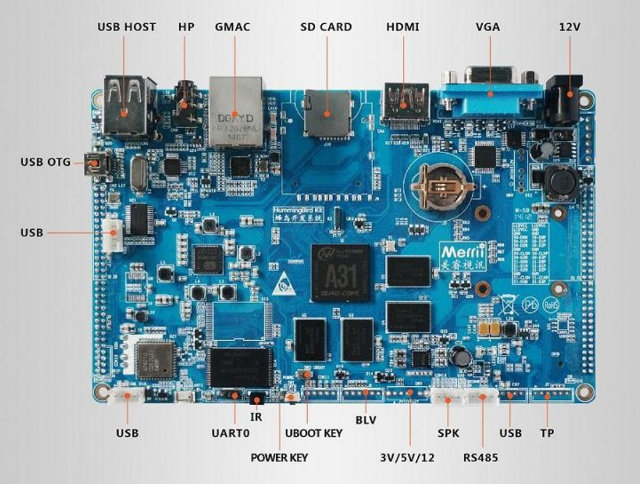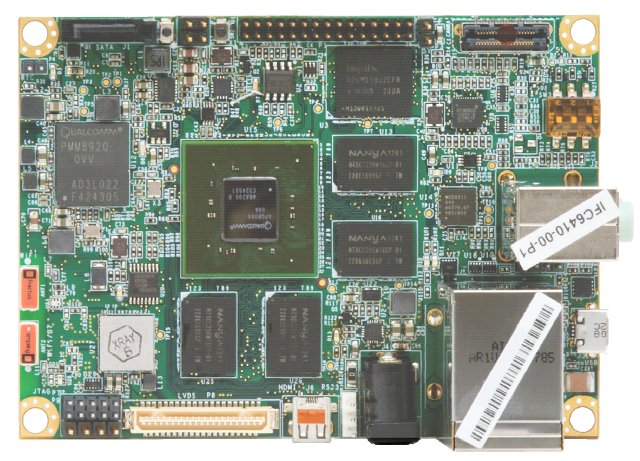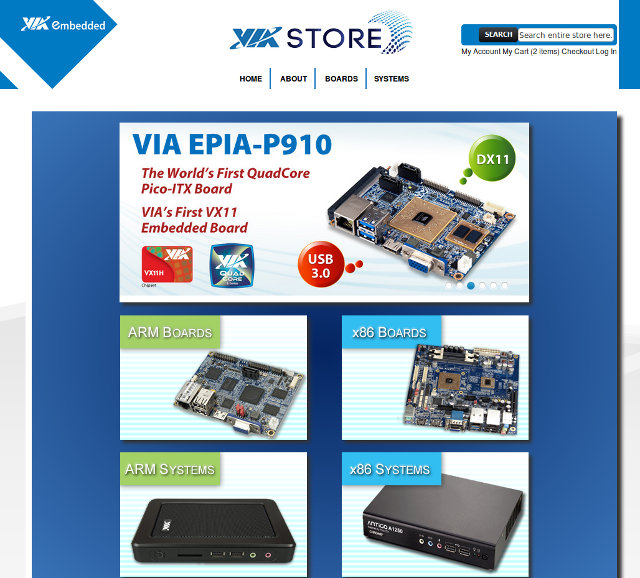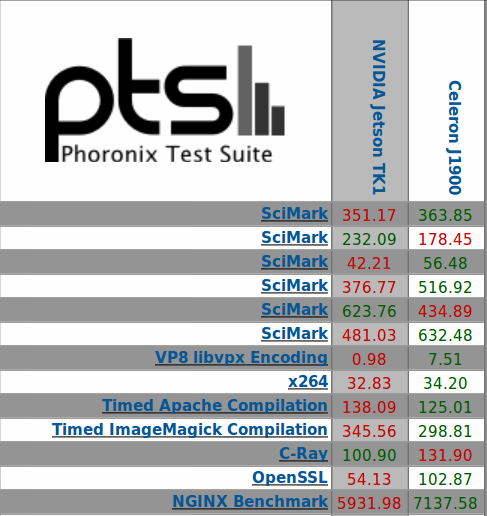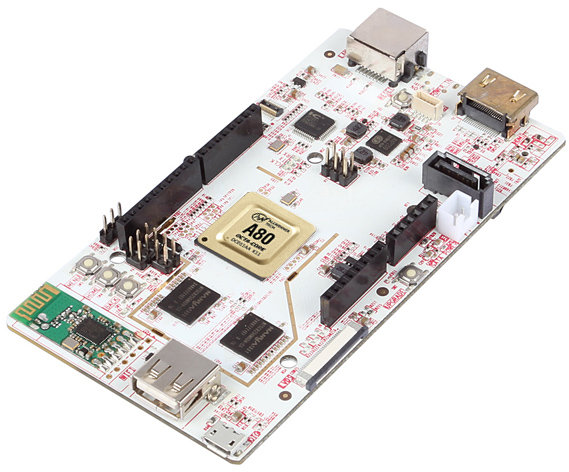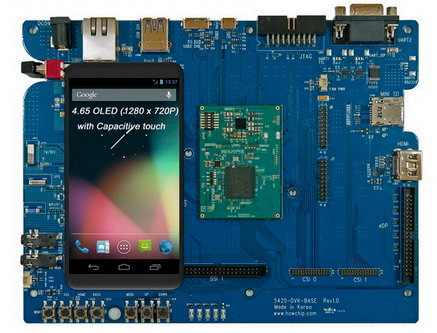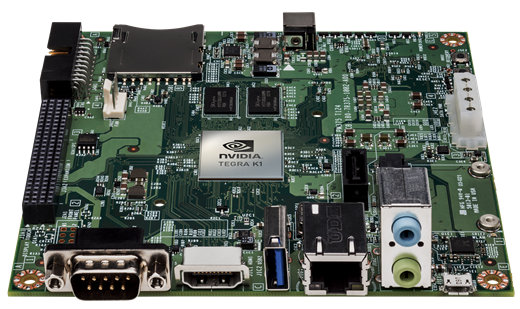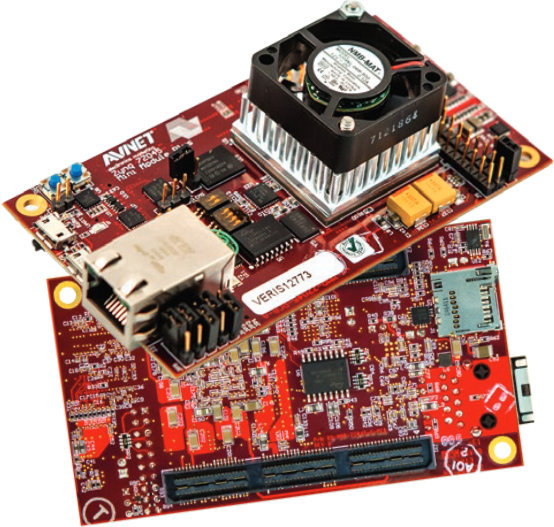Merrii Technologies introduced the Hummingbird development kit powered by AllWinner A20 last year. Since then they’ve sold 10,000 pieces, and have been working on another development board based on AllWinner A31 with lots of different ports and options, including an optional 7″ capacitive touch screen. “Quad Core” Hummingbird specifications: SoC – AllWinner A31 quad core ARM Cortex-A7 with PowerVR SGX544MP2 GPU compliant with OpenGL ES2.0, OpenCL 1.x, DX 9_3 System Memory – 1GB DDR3 Storage – 8GB Flash + micro SD card slot Video Output – HDMI, VGA, LVDS Video Input – 3.5mm jack for CVBS (or YPbPr?) In (TV IN) Audio I/O – HDMI, 3.5mm jack for stereo audio, 3.5mm jack for Line IN (Same as TV IN). 2x 15w amplifier on-board. Camera – MIPI interface Connectivity – Gigabit Ethernet, 802.11 b/g/n Wi-Fi and Bluetooth (AP6210 module) Cellular Connectivity – SIM card slot + mini PCIe connector for 3G […]
Snapdragon 600 based IFC6410 Development Board is Available for $75 For a Limited Time
Despite their popularity with tablets and smartphones, I don’t see much developer community around Qualcomm Snapdragon processor, and only a few low cost development boards. One of them is Inforce Computing IF6410 pico-ITX board powered by Qualcomm Snapdragon 600 (APQ8064) quad core processor with 2GB RAM, 4GB eMMC flash, Gb Ethernet, Wi-Fi, Bluetooth, SATA, micro HDMI and LVDS video outputs, etc.., that normally sells for just $149. But the company is having a promotion for $75 with the coupon code “makerfaire” until May 18, or until the 500 units they’ve reserved are sold out. Shipping is not included in the price, and you’ll have to add about $50 for Fedex delivery (It may be cheaper in the US) for a total of about $125, which still probably makes it the cheapest “Cortex A15 class” board that you can get. The board appears to only officially support Android, and if you […]
VIA Embedded Store Launches for Embedded ARM & x86 Boards and Systems
Most of the time for boards and systems targeting industrial or embedded applications, companies will not provide pricing information, and if you want a sample for evaluation, or want to order a few for a project requiring limited quantities, you’ll need to contact sales, talk about your project, volume, schedule, etc… But for VIA Embedded boards and systems, you won’t need to go through this loop anymore, as the company has just launched VIA Embedded Store where you can buy boards such as VAB-820 pico-ITX board or a rugged system such as AMOS-820 directly online without questions asked. I’ve gone through most of the checkout procedure and you can proceed as a guest or by registering, and they’ll just ask billing and shipping information, shipping method, and payment method selection (Only Paypal at this time). It’s a simple as that, no need to fill some “I’m not a terrorist” forms […]
Nvidia Tegra K1 CPU/FPU Performance is Comparable to Intel Celeron “Bay Trail-D” J1900 SoC
Nvidia Jetson TK1 development board powered by Nvidia Tegra K1 quad core ARM Cortex A15 processor and a 192-core Kepler GPU has started shipping, and some people have already received theirs, including Michael Larabel (Phoronix) who ran some benchmarks on the board that comes pre-loaded with Ubuntu 14.04 LTS. We already had some benchmarks comparing Tegra K1 to ARM peers on Android, but it’s the first time Linux benchmarks are available. The benchmarks seems to only involve CPU and FPU, and probably not the GPU at this point, but the results are still interesting, and Michael also pointed links comparing Nvidia Tegra K1 development board performance to some Intel Core i5 based PCs, as well as a platform based on an Intel Celeron J1900, a quad core processor part of Bay Trail Desktop family. The later is most interesting as we compare systems with similar power requirements. Nvidia Tegra K1 […]
PcDuino8 Board Will be Powered by AllWinner A80 SoC
Many have been waiting for A80 OptimusBoard development board powered by AllWinner A80 octa-core big.LITTLE SoC to come to market. It could be another board will be targeting the DIY crowd, as LinkSprite and AllWinner have announced a strategic partnership to work on PcDuino8 board also based on the upcoming eight core SoC. The board picture above appears to be exactly the same as PcDuino3 with AllWinner A20, except they’ve replaced it with A80. This is really odd by itself, and since AllWinner A80 does not support SATA, an extra USB to SATA IC would be required. The lack of USB3 port is also surprising. So I’m assuming the board above is simply a photo edited in Photoshop. We could then further assume the board is not ready, and they are simply waiting for the PCB, which will they debug in May, before shipping the board by the end of […]
HOWCHIP 5420-DVK is a Mobile Development Kit with Samsung Exynos 5420 SoC, an OLED Display
With Arndale Octa already shipping, and the upcoming ODROID-XU2, we already have two low cost boards with Samsung Exynos 5420 big.LITTLE processor for less than $200. But if you want a more complete kit, HOWCHIP 5420-DVK with a 4.65″ OLED display and capacitive touchscreen, 2GB RAM, 4GB eMMC, and various connectors, could be an option. There’s also a Lite version without the OLED display. The board is composed of a CPU module, a baseboard, and a phone like display. Here are the specifications: SoC – Samsung Exynos 5420 Octa with 4x ARM Cortex A15, and 4x ARM Cortex A7 in big.LITTLE configuration, with Mali-T628 GPU. System Memory – 2GB LPDDR3 (POP with CPU) Storage – 4GB eMMC 4GB on board, SD card Slot Video Output HDMI type A connector MIPI DSI header up to 1980×1080 eDP (Embedded Display Port) header up to 2560×1600 Display – 4.65″ OLED (1280×720) with touch […]
Nvidia to Give Away 50 Jetson TK1 Development Boards
Nvidia Jetson TK1 is a development board powered by Tegra K1 quad core Cortex A15 SoC including a 192-core Kepler GPU. This is one the the best, if not the best, ARM platform when it comes to GPU performance, GPGPU capabilities, and the only one I know of that supports OpenGL 4.4 “Desktop”, as well as Nvidia’s CUDA 6.0. You can buy the board for $192, but if you are a developer and have a project that could leverage and showcase Tegra K1 capabilities for computer vision solutions for robotics, medical devices, military, and automotive applications, you may well get one board for free via Nvidia’s Tegra K1 CUDA Vision Challenge. To apply, you need to submit your proposal via Nvidia’s TK1 vision challenge page by April 30, 2014. Please note, the contest is only open to US residents. The company will then consider the various proposals based on innovativeness, […]
Xilinx Zynq-7000 All Programmable SoC Mini-Module Plus System-on-Module
In January 2014, Avnet announced Xilinx Zynq-7000 All Programmable SoC Mini-ITX board featuring Xilinx Zynq-7045 or Zynq-7100 ARM + FPGA SoC, and more recently, the company has launched “Xilinx Zynq-7000 All Programmable SoC Mini-Module Plus” systems-on-module (SoM) based on the same platforms, as well as a corresponding development kit including a baseboard and a power module. The SoM and development platform target PCI Express, embedded controllers, general-purpose prototyping, networking and communications, storage and servers, and Ethernet/Internet applications. Xilinx Zynq-7000 Mini-Module Plus specifications: SoC- Xilinx Zynq-7045 or Zynq-7100 dual core Cortex-A9 @ up to 1GHz with FPGA (350K or 444K logic cells) System Memory – 1GB DDR3 SDRAM Storage – 128MB parallel flash, 32MB QSPI flash, 8KB EEPROM, and micro SD slot Connectivity – Gigabit Ethernet USB – USB 2.0 OTG port Debugging – USB UART, JTAG programming/configuration port, PJTAG header User’s IO via dual board-to-board connectors: 132 User I/O (66 […]


